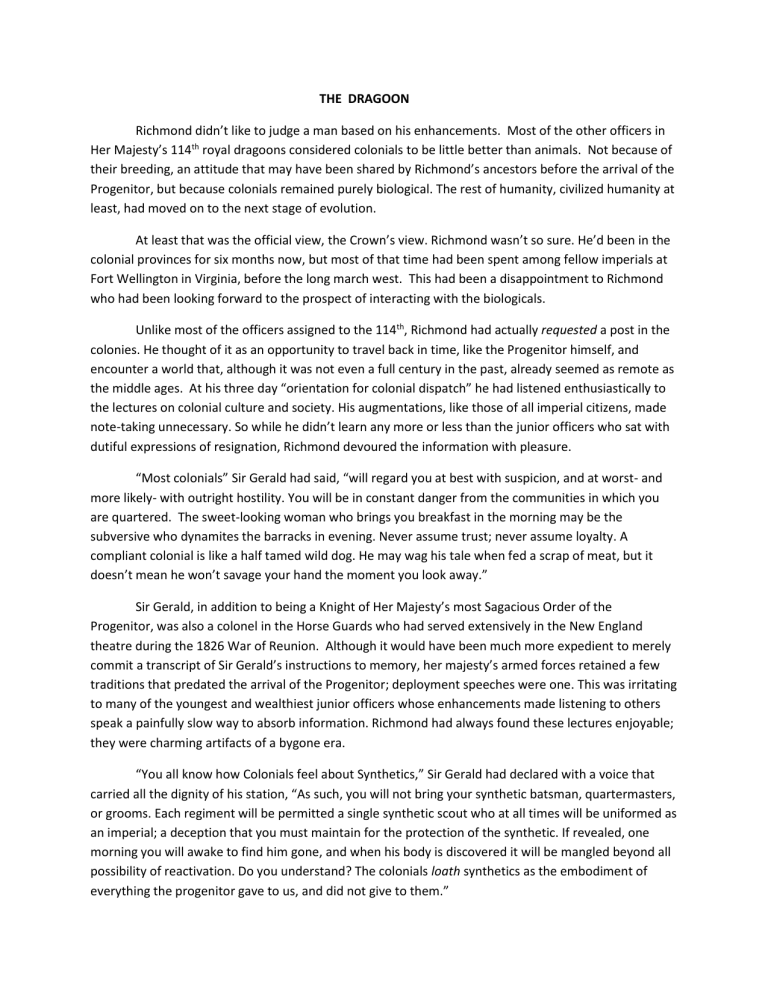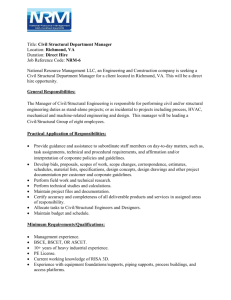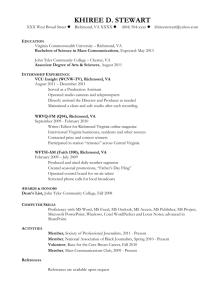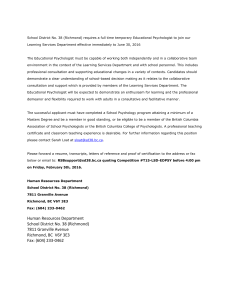THE DRAGOON Richmond didn't like to judge a man based on his

THE DRAGOON
Richmond didn’t like to judge a man based on his enhancements. Most of the other officers in
Her Majesty’s 114 th royal dragoons considered colonials to be little better than animals. Not because of their breeding, an attitude that may have been shared by Richmond’s ancestors before the arrival of the
Progenitor, but because colonials remained purely biological. The rest of humanity, civilized humanity at least, had moved on to the next stage of evolution.
At least that was the official view, the Crown’s view. Richmond wasn’t so sure. He’d been in the colonial provinces for six months now, but most of that time had been spent among fellow imperials at
Fort Wellington in Virginia, before the long march west. This had been a disappointment to Richmond who had been looking forward to the prospect of interacting with the biologicals.
Unlike most of the officers assigned to the 114 th , Richmond had actually requested a post in the colonies. He thought of it as an opportunity to travel back in time, like the Progenitor himself, and encounter a world that, although it was not even a full century in the past, already seemed as remote as the middle ages. At his three day “orientation for colonial dispatch” he had listened enthusiastically to the lectures on colonial culture and society. His augmentations, like those of all imperial citizens, made note-taking unnecessary. So while he didn’t learn any more or less than the junior officers who sat with dutiful expressions of resignation, Richmond devoured the information with pleasure.
“Most colonials” Sir Gerald had said, “will regard you at best with suspicion, and at worst- and more likely- with outright hostility. You will be in constant danger from the communities in which you are quartered. The sweet-looking woman who brings you breakfast in the morning may be the subversive who dynamites the barracks in evening. Never assume trust; never assume loyalty. A compliant colonial is like a half tamed wild dog. He may wag his tale when fed a scrap of meat, but it doesn’t mean he won’t savage your hand the moment you look away.”
Sir Gerald, in addition to being a Knight of Her Majesty’s most Sagacious Order of the
Progenitor, was also a colonel in the Horse Guards who had served extensively in the New England theatre during the 1826 War of Reunion. Although it would have been much more expedient to merely commit a transcript of Sir Gerald’s instructions to memory, her majesty’s armed forces retained a few traditions that predated the arrival of the Progenitor; deployment speeches were one. This was irritating to many of the youngest and wealthiest junior officers whose enhancements made listening to others speak a painfully slow way to absorb information. Richmond had always found these lectures enjoyable; they were charming artifacts of a bygone era.
“You all know how Colonials feel about Synthetics,” Sir Gerald had declared with a voice that carried all the dignity of his station, “As such, you will not bring your synthetic batsman, quartermasters, or grooms. Each regiment will be permitted a single synthetic scout who at all times will be uniformed as an imperial; a deception that you must maintain for the protection of the synthetic. If revealed, one morning you will awake to find him gone, and when his body is discovered it will be mangled beyond all possibility of reactivation. Do you understand? The colonials loath synthetics as the embodiment of everything the progenitor gave to us, and did not give to them.”
Richmond understood very well. In Britain and the imperial continent, synthetic humans provided the backbone of the agricultural, industrial, and domestic labor that had once been the responsibility of the human underclasses before the arrival of the progenitor. The coming of the progenitor had liberated the bulk of humanity from the chains of labor into enhancement. Synthetics, although most philosophers agreed that they were conscious beings, owed their brief seven year lifespans entirely to their imperial creators, so it seemed only right that they should spend those years working for the glory of those who gave them life. In the colonies, however, synthetics were extremely rare. This was one of the few corners of the British Imperium where labor was performed primarily by biological humans as it was in the dark ages.
Many imperials couldn’t understand why the colonials, of all people, didn’t embrace the arrival of synthetics. They still lived under the yoke of manual toil, and while the Imperium was not ready to grant them enhancement, Her Majesty’s generosity would certainly have extended to providing synthetics in order to increase productivity.
Richmond himself struggled to understand the colonials’ unwillingness to accept synthetics, until he the day purchased a dozen wagons from a colonial carter named Wilson Parsons Langly, shortly before the 114 th left Fort Wellington to march west. During Sergeant Collins’s inspection of the wagons he noticed, with some amusement, that Langly had gone through the trouble of sanding even the undercarriages- the parts that no one would see. Collins had laughed at the stupidity of it.
“Is there some sort of problem with my work Cap’n?” Langly asked. He was a rough looking man, dark haired and of indistinguishable age, as was so often the case with the biologicals who endured the hardships of a colonial existence.
Richmond smiled. “Not at all Mr. Langly. Sergeant Collins was just observing that you went to a great deal of trouble to visually perfect a portion of the wagons which no one will see.”
Langly had squinted at him then with an expression that Richmond could not quite decipher.
“Thing is Cap’n, I’d see it. Every time that wagon went by, I’d know I didn’t do the job proper.”
It was then that Richmond realized why the colonials hated synthetics. They were afraid of them. The colonials took a queer pride in performing the most mundane jobs as though they were making art- as though a wagon that was sanded underneath were somehow objectively superior to one that was not. Richmond decided he liked that. There was something beautiful in this impractical and inefficient value system.
Sir Gerald’s single ice blue ocular enhancement had gleamed as he straightened up and prepared to dismiss the junior officers. “One more thing, gentlemen. The colonials may hate the synthetics, but many of them have a similar, if less intense and more irrational distaste, for the dark skinned biologicals among them. You all know the historical reasons. Dark skinned biologicals were used like a synthetic underclass before her Majesty’s imperial forces restored our union with the colonies, and put an end to this irrational and barbaric custom. As such, you may find dark skinned colonials more compliant and more reliable as allies. However, even when dealing with those who owe the
Imperium the greatest debt, tread cautiously. Their loyalties are far from certain.”
“The prisoner is ready for you Sir.” Sergeant Collins stood at attention, his copper and brass
NCO’s hand raised to his brow, palm out, in the salute that had been used by her Majesty’s armed forces since before the arrival of the progenitor almost 75 years ago.
“Thank you Sergeant, that’ll be all.” Captain Samuel Richmond of her Majesty’s 114 th Royal
Dragoons approached the drifter’s cabin, which had been boarded up as a holding cell for the rebel.
Richmond was an imposing man, tall with short sandy blonde hair, and deeply brown eyes that showed no trace of the ocular enhancement that would be typical for a man of his rank. He did, however, have the steel right hand that was the mark of all commissioned officers. He wore the red jacket and blue cavalry breeches of his unit, and the curved sabre that was carried by all of Her Majesty’s mounted soldiers.
Richmond opened the door of the cabin which was small, and smelt strongly of cedar smoke, which was strange as prisoner had been permitted no fire. The Rebel was hunched in a dark quarter opposite the door, his knees pulled up to his chest; he held up a hand to shield his eyes from the light and squinted through his fingers at Richmond.
“Your name is Willim, is that right?”
“Yeah, that’s right.” The prisoner responded in a tone that suggested defiance, although it was plain to see that there wasn’t much left in him. He had not had food for three days and the cabin was frigid at night.
“Willim, would you join me for breakfast? I thought we might talk for a while.”
The rebel was quiet for a moment, pondering the nobility of refusing the invitation. “That’s mighty kind of you, but I’m not sure you and I have much to say to each other.”
Richmond smiled. “I don’t know about you Willim, but I frequently find myself breakfasting with those to whom I have nothing to say. I promise it will be no more painful than a visit from an undesirable relation.” Richmond stepped back and stood sideways to the door, gesturing for Willim to join him. Hunger triumphed over pride, as Richmond hoped it would; Willim rose stiffly and walked into the sunlight.
Richmond sat across from Willim at a small folding table; a breakfast of bacon, beans, and blackened toast with tea lay between them. Willim was hungrily devouring his beans, while trying to retain some of his dignity. He gazed suspiciously at Richmond, who smiled back pleasantly.
“For a man who wants to talk, you don’t say too much” Willim observed, as he was scraping beans onto a heel of toast.
Richmond leaned back his canvas chair and lifted the tin cup of tea, the steel of his officer’s fist clinking against the metal of the mug. “I thought you might appreciate the opportunity to enjoy your breakfast uninterrupted” Richmond replied courteously. “But perhaps we should begin. Lieutenant
Greeves tells me that his patrol surprised you last Thursday morning, while you were wiring seventeen pounds of dynamite to Bridge 14 of Her Majesty’s Transamerican Railroad.” Richmond said this in the matter-of-fact way he might tell a fellow officer that he had once seen the man play Rugby for the
Oxford sevens. He sipped his tea.
“Well, that ain’t exactly a question, now is it.” Wilim lifted his own mug and drank.
Richmond smiled. “True. Do you like the tea? It’s Ceylon, from the Indian colonies. The lads carry it loose in their saddlepacks and pray it doesn’t rain. Tea has practically become a form of currency in the army. Three tablespoons of that would buy you a cigar.”
Willim shrugged. “Never had it before. We drink coffee here mostly.”
“You do.” Richmond agreed. “Lieutenant Greeves found a pound of it in your dry bag, along with a cook-kit, 12 dollars in gold, and these.” Richmond laid a pair of copper-banded augmentation goggles on the table. Goggles like this were common enough in Britain and on the imperial continent, where they were used by overseers to keep track of synthetics, but in the colonies they were illegal. “Tell me
Willim, why would a man like yourself-”
Willim interrupted him. “I think we both know the answer to that Captain. Look, I appreciate the breakfast, but we both know what the situation is here and I ain’t interested in whatever parlor game this is we’re playin’ right now. You know what I done, and you know damn well what we use those goggles for, so if you’re gonna hang me, let’s be done with it.”
Richmond picked up the tea pot and refilled Wilim’s cup, then his own. “Have you ever actually
met a synthetic Willim?”
The rebel scowled. “You can’t meet something that ain’t alive captain. You ever met a steam engine?”
Richmond fixed his brown eyes on Willim. “What makes you so sure synthetics aren’t alive?
Their brains aren’t very different from yours- just made of different material. They have thoughts, make choices, are capable of emotional responses. If I am correct about what you may have used those goggles for in the past- and about your membership in a certain organization- then you should know that they feel fear at least.”
Wilson glared at Richmond. “They’re machines captain. How can a thing that is a machine be
alive? As for fear, well, just ‘cause it hollers, don’t mean it’s a cat.”
“I’m sorry, I’m not familiar with that expression.”
“Crocodile tears captain. My daughter, lord rest her sole, used to love this doll her mother and I bought for her in Boston- technically illegal of course, but that type of contraband no one bothers about.
Well this doll had a string in its back- and when you pulled it, the doll would cry. Lord, she loved that doll. Loved it so much that when I buried my little girl, I put two things in the grave with her and one was that doll- the other was a pendant her mother gave her.” Willim paused for a moment- and stared out at the line of horses, tied at attention, the sunlight glittering off their ruby eye enhancements. Their breath fogged the chill autumn air like exhaust. When he spoke again, his voice that had been momentarily gravely with grief was steady. “I figure a synthetic that cries really ain’t no different from that doll. It’s just a better machine.”
Richmond nodded. He knew better that to offer unwanted condolences. He felt for the man, but he was also determined to continue the conversation. If truth be told, Richmond had been looking forward to the opportunity to discuss this issue with a colonial who would answer him honestly, as few would.
He decided to take a different tact. “You are suggesting that because a synthetic’s brain is not composed of organic material, that it could not possibly have a consciousness like ours.”
Willim smiled at Richmond and shook his head. “Do you hear yourself talk, Captain? I sometimes wonder if you imperials know just how arrogant you sound. Did ya learn to talk that way at Oxford? Or do they just cut open your head over there in England and stick a gear in for talking like a jackass?”
Richmond ignored the insult. If he were honest, he had expected a great deal more of this sort of thing from the colonials. In reality, all of the colonials he had met so far had been courteous, if distant. He suspected they were afraid to have an honest conversation with him. “Let me ask you something. How do you know other biological humans have minds? How do you know that they have thoughts and feelings like yours?”
Willlim bristled. “What kind of question is that? They’re people! Of course they have minds.”
Richmond continued, “but how do you know. You assume they have thoughts, and feelings, and a mind like yours because they appear to make choices and because they react to external stimuli in the same way you would as a result of the thoughts and feelings that those stimuli would produce in you.
You know that if you were to spill boiling water on your leg, you would experience pain and cry out. So when you witness another man spill water on his leg, and he cries out, you assume he is experiencing pain, but the truth is you can’t be sure he feels anything like what you feel.”
Wilim scowled. “I’m not sure I follow you captain, must be I can’t keep up with that enhanced brain of yours- but that sounds to me like the biggest load of horseshit I ever heard.”
Richmond shook his head. “I think you understand me just fine. Let me put it to you another way- you are a man who knows what is like to lose a daughter. Have you ever known another man who experienced a similar loss?
Willim was giving Richmond a dangerous look now. “Course I have,” he said flatly. Life out here ain’t near so comfortable as I suspect it is where you come from.”
“When you observe a man weeping, who has recently lost a child, you assume that he is feeling grief. You can’t know for sure, because you can’t experience his grief. But you know that when you lost a child, you cried and looked as he looks now- so you infer that he is having an emotional experience like your own.”
Willim just stared at Richard.
“Well, I can tell you, as I suspect you already know, that synthetics grieve when they lose loved ones- and their grief looks very much like yours. They weep, they mourn, they become solemn, they do all of the things that you do, under the same circumstances that you do those things. You have as much reason to infer that synthetics have thoughts and feelings as you do to assume other people have thoughts and feelings. The only difference between you and a synthetic is the material out of which you are constructed.”
For a moment, it looked as though Willim might flip the table. “No Captain. The difference between us is that I weren’t constructed. Now let me tell you something that I wish to God you stuck-up redcoated bastards could get through your gears: machines ain’t people. Course you’re really all half machines yourselves, so maybe that’s why you’re in such a godamn hurry to stand up for the skinsleeves.”
Willim stood up suddenly. Sergeant Collins, who had been standing at attention about ten pace behind Richmond snapped his carbine into his shoulder, aiming squarely at Willim’s chest. Richmond did not even need to look at Collins, he heard the click of the carbine and raised his hand. He said loudly and calmly, “Thank you sergeant, that won’t be necessary.” Collins hesitated a moment, and then lowered the weapon, but he kept it cocked.
“Thing is captain, I wish I never put that doll in my daughter’s grave. Cause now there’s only three things underneath that stone, my daughter’s bones, her mother’s locket, and whatever piece of machinery was inside of that doll. I got no problem with machines Captain, their just tools, but I wish my little girl didn’t have a piece of you in there with her. That’s the difference between us Captain. When I die, soon enough there won’t be but bones in my grave. But you, the worms will be crawling over that hand of yours and through your skull to whatever other pieces of metal you’ve added to try and improve on the form God gave you. Your grave will be like that till Judgement day: half burial plot, half scrap yard.”
Richmond extended his biological hand towards Willim’s empty chair. “Please, sit down, I did not mean to offend you Mr…?
Willim stared hard at Richmond. “Curtis.”
“Mr. Curtis, I apologize. As you point out, I am new to your country and I have been looking forward to meeting someone like you who is willing to be honest. Please.”
“I think I’m just about done talking Captain.”
Richmond sighed. “Very well.” He climbed slowly to his feet, resigned to the bureaucratic necessity of the task before him. When he spoke again, his voice was more formal. “Just one more thing then; are you a member of The Sons of Liberty? Willim said nothing, just stared. “Brotherhood of the
Eagle?”
“Like I said Captain, I’ve said all I want to say.”
Richmond stood. “Alright Mr. Curtis, have it your way. Sergeant Collins!”
“Sir!”
“Please take the prisoner to the edge of the glade and hang him.”
“Yes Sir.” Collins turned to his squadron, who were sitting not far off, waiting for the outcome of this meeting. “Alright lads! You heard the Captain.”
Willim did not struggle. But he did call out to Richmond, who had turned and was walking towards the line of tents that sheltered the sixty dragoons under his command. “Captain!”
Richmond turned to face Willim. “Yes?”
“I know you’ve got no reason to do me any favors, but if you’re willing, I’d like to be buried beside my little girl, in Kansas City.”
Kansas City was well out of their way, at least twenty miles, and such an errand would deprive
Richmond of a Squad of men for at least three days. Richmond gazed at Willim for a moment, then answered. “Of course. You have my word.” Willim just nodded, but in his eyes there was gratitude.
Officially, this type of errand was against Crown Policy, which rejected the use of Her Majesty’s assets all such inefficiencies. Richmond, however, prided himself on keeping his word, even when it was irrational to do so. Perhaps this is why he liked the colonials. There was something beautiful in their misguided conception of the world.






